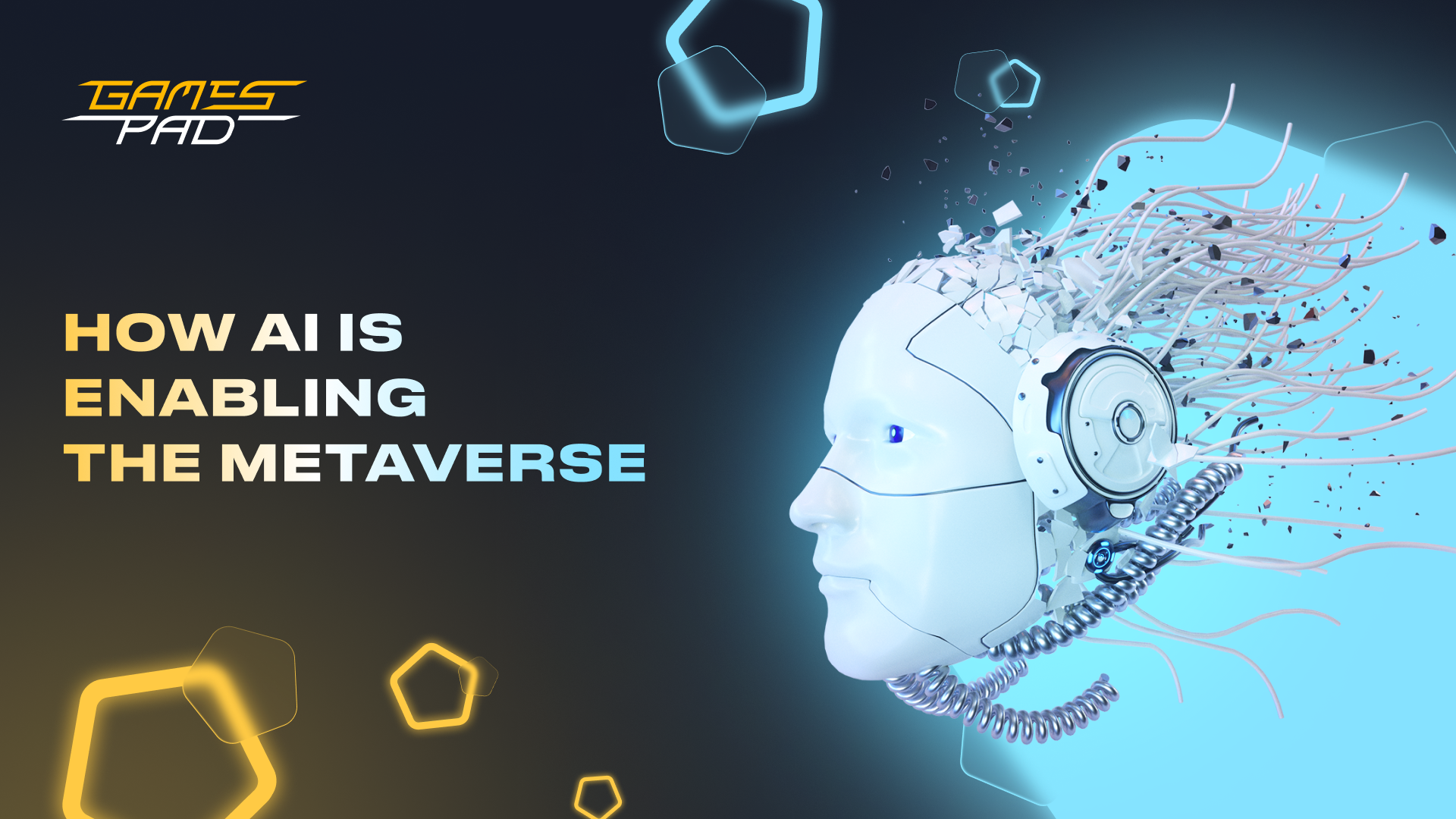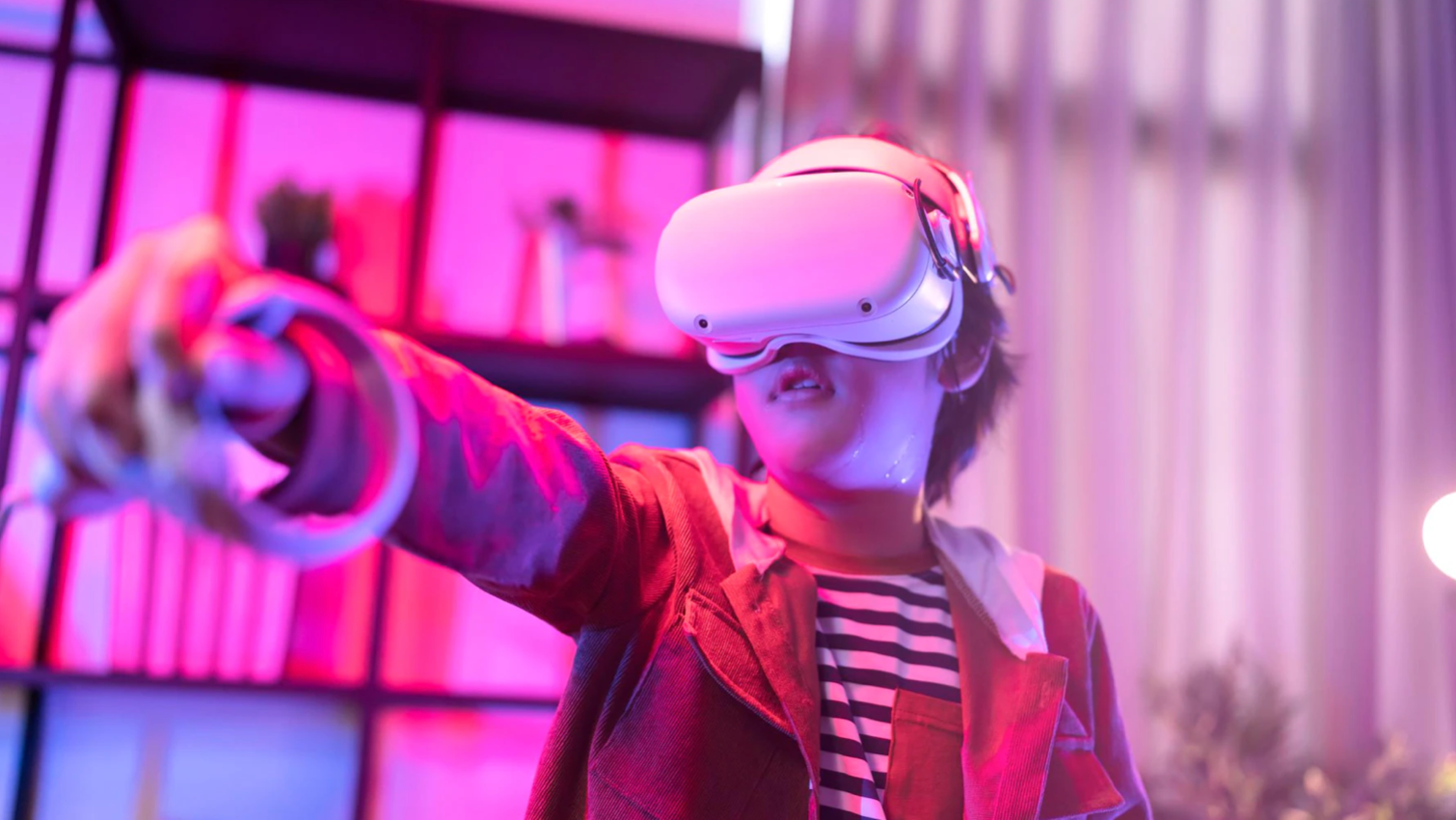
The Metaverse is the virtual world of tomorrow, a shared and persistent space where people can interact with each other and explore immersive digital environments. The development of this technology has been rapid in recent years due to advances in artificial intelligence (AI).
AI is playing an increasingly important role in creating and advancing the Metaverse as it enables more realistic interactions between users, facilitates better user experiences, and allows for more complex simulations.
In this article, we’ll look at how AI is enabling the Metaverse by discussing its applications in virtual reality, user experience design, and simulation-based learning. We will also examine some potential challenges that may arise from further integration of AI into these technologies. By understanding both the opportunities and risks associated with using AI within the Metaverse environment, we can begin to unlock its full potential for creating innovative new worlds for us all to explore. So, let’s start!
Artificial intelligence is revolutionizing the way we experience the Metaverse. Thanks to AI, users can now immerse themselves in virtual worlds that feel even more realistic than ever before. The benefits of AI in the Metaverse are numerous, ranging from improved user experience to greater personalization options.
One of the most significant advantages of AI in the Metaverse is its ability to create more natural and responsive interactions between users. With AI-powered chatbots, for example, users can communicate with virtual characters in real time, creating a more human-like experience. Additionally, AI can help personalize the environment in the Metaverse, tailoring it to the needs and preferences of individual users. This means that users can have unique experiences based on their interests and preferences, allowing for a more personalized and engaging experience.
Another benefit of AI in the Metaverse is its ability to help simulate complex scenarios and environments. AI-powered simulations can recreate real-world scenarios in a virtual environment, making it easier for users to learn and gain experience in a wide range of fields, such as medicine, engineering, and even space exploration. This technology has the potential to revolutionize education and training, helping individuals learn faster and more efficiently than ever before.
AI also plays a critical role in user experience design in the Metaverse. By analyzing user behavior and preferences, AI algorithms can optimize the virtual environment to create a more intuitive and immersive experience. This means that users can enjoy a more seamless and realistic experience without the need for clunky controls or awkward interfaces.
Overall, the benefits of AI in the Metaverse are numerous and far-reaching. With advanced AI algorithms and powerful computing resources, we can create virtual worlds that are more engaging, personalized, and immersive than ever before.
AI is opening up new opportunities for creating immersive experiences in the Metaverse. One of the most exciting applications of AI in this context is AI-powered chatbots. Chatbots offer users a more natural and conversational experience, allowing them to interact with virtual characters in real-time. These chatbots can also understand and interpret user intent, providing a personalized experience that is tailored to each user’s needs and interests.
In addition to chatbots, AI-powered recommendation engines are another area of interest. These engines can analyze user behavior and preferences to provide personalized recommendations for products and experiences within the Metaverse. This has the potential to increase engagement and retention, as users are more likely to engage with content that is relevant and interesting to them.
Another use case for AI in the Metaverse is automated content creation tools. AI algorithms can analyze vast amounts of data to generate new content, such as virtual worlds, characters, and landscapes. This has the potential to greatly speed up the development of new content within the Metaverse, as well as provide a more diverse range of experiences for users.

While AI has tremendous potential to revolutionize the Metaverse, there are also potential challenges and limitations that must be addressed. One of the most significant concerns is the issue of bias. AI algorithms are only as unbiased as the data that is used to train them. If the data is biased, the algorithm will also be biased, potentially leading to discriminatory outcomes in the Metaverse.
Another challenge is related to privacy concerns. As users engage with virtual worlds and interact with AI-powered chatbots, they generate vast amounts of personal data. This data can include sensitive information such as user preferences, behaviors, and even biometric data. As such, it is critical to ensure that this data is protected and not misused.
In addition to these challenges, there is also the issue of ethical considerations. As AI becomes more advanced and powerful, it is important to consider the implications of these technologies on society as a whole. For example, there is the potential for AI to exacerbate existing societal issues such as income inequality and job displacement.
Furthermore, there are also technical limitations to consider. While AI algorithms have come a long way in recent years, there are still areas where they struggle. For example, creating truly realistic and immersive experiences in the Metaverse requires not just advanced AI, but also powerful computing hardware.
To address the challenges and limitations of AI in the Metaverse, there are potential solutions that can be explored. For example, to tackle the issue of bias in AI algorithms, it is important to ensure that the data used to train these algorithms is diverse and representative of all users. This means collecting data from a wide range of sources and ensuring that there is no inherent bias in the data itself.
To address privacy concerns, it is important to implement strong data protection measures, such as encryption and data anonymization. This can help prevent sensitive user information from being accessed by unauthorized parties. Additionally, it is essential to establish clear and transparent data policies so that users understand how their data is being collected, used, and protected.
Addressing ethical concerns requires a collaborative effort between industry leaders, policymakers, and experts in the field. These stakeholders must work together to develop ethical frameworks for the use of AI in the Metaverse and to ensure that these technologies are used in a responsible and ethical manner. This may involve implementing regulations and guidelines for the use of these technologies, as well as educating the public about the potential benefits and risks of AI.
Finally, to address the technical limitations of AI in the Metaverse, significant advancements in computing hardware will be necessary. This includes the development of more powerful GPUs, CPUs, and other hardware components, which can enable more complex and realistic virtual environments to be created.
With that in mind, we can say that while AI in the Metaverse presents exciting new opportunities for creating immersive and engaging experiences, there are also significant challenges and limitations that must be addressed. Through collaboration and innovative solutions, we can unlock the full potential of AI in the Metaverse while ensuring that these technologies are used in a responsible and ethical manner.

The use of AI in the Metaverse has already started to impact the way we experience virtual worlds. One example is the creation of AI-powered chatbots that can hold realistic conversations with users, providing personalized recommendations and assistance.
Another example is the implementation of AI in the creation of realistic avatars. By analyzing user data and personal biometrics, AI algorithms can generate avatars that closely resemble their real-world counterparts, creating a more personalized and immersive experience.
In addition, AI is being used to enhance the overall level of interactivity and engagement within virtual worlds. For example, AI can analyze user behavior and preferences in real-time, adjusting the virtual environment to suit their interests and preferences better. This can lead to a more engaging and personalized experience for users.
Moreover, AI is being used to create more realistic and immersive environments. By simulating real-life physics and behavior, AI can create virtual worlds that closely resemble our physical world, enhancing the level of realism and engagement.
The benefits of using AI in the Metaverse are numerous. With AI-powered chatbots, users can receive personalized assistance and recommendations, creating a more engaging and rewarding experience. The use of AI-generated avatars can also enhance the level of personalization within virtual worlds, creating a more immersive and personalized experience.
Furthermore, the use of AI to analyze user behavior and preferences can lead to more engaging and interactive virtual worlds. By adjusting the virtual environment to suit their interests better, users can have more fun and engaging experiences within the virtual world.
Overall, the use of AI in the Metaverse has the potential to revolutionize the way we experience virtual worlds. By enhancing the level of personalization, interactivity, and realism, AI can create more engaging and rewarding experiences for users. However, it is important to address the challenges and limitations of AI to ensure that these technologies are used in a responsible and ethical manner.

Looking towards the future, AI has the potential to transform the Metaverse and create a wide range of new opportunities and benefits for businesses and users alike. One area where AI is expected to have a significant impact is in the creation of even more realistic and immersive virtual environments.
As AI technology continues to evolve and become more sophisticated, we can expect to see the development of virtual worlds that are even more interactive, exciting, and engaging. This could lead to new business opportunities for companies that specialize in developing VR and AR technologies, as well as entrepreneurs who see the potential of creating new virtual experiences and offerings.
In addition, as already mentioned, AI can be used to facilitate more efficient and effective communication between users within virtual worlds. This could create new opportunities for businesses that aim to provide virtual services and support, such as customer service or technical support.
Another potential benefit of AI in the Metaverse is the ability to analyze user data and preferences in real-time, providing more personalized experiences for users. This could help businesses target their marketing efforts more productively, creating a more engaging and effective online presence.
Furthermore, AI could be used to facilitate more seamless and natural interactions between users and virtual objects within the Metaverse. This could allow for more realistic and immersive gaming experiences, as well as new applications in such fields as education and training.
Overall, AI holds immense potential for transforming the Metaverse and creating more engaging virtual environments. As far as we can see, the Metaverse AI combination is something incredible. By analyzing user behavior in real-time, adjusting the environment to suit their interests better, and facilitating smoother interactions with objects within the virtual world, AI can create a much more immersive experience for users.
However, it is important to consider any challenges or limitations that may arise from using these technologies responsibly and ethically. The future of AI-enabled Metaverses promises an exciting array of new opportunities for users, businesses and entrepreneurs alike – one where creativity knows no bounds! With this technology being developed rapidly every day, we are sure to be on the brink of something truly amazing soon enough.
We hope you’ve enjoyed this “Metaverse AI” article, where we have mentioned all the key elements and most exciting aspects. But if you want to learn more about virtual space in general, you should read our GamesPad blog. There, you will find many articles about Metaverse and virtual reality, including digital humans, virtual spaces, virtual assistants, user-generated content, how to create avatars, a decentralized world in general, Metaverse technology, digital assets, VR world, and more.
Would you like to start investing in the most impactful crypto gaming, NFT and metaverse projects with GamesPad? Learn how in this comprehensive tutorial!
Disclaimer. This material should not be construed as a basis for making investment decisions or as a recommendation to participate in investment transactions. Trading digital assets may involve significant risks and can result in the loss of invested capital. Therefore, you must ensure that you fully understand the risk involved, consider your level of experience, investment objectives, and seek independent financial advice if necessary.